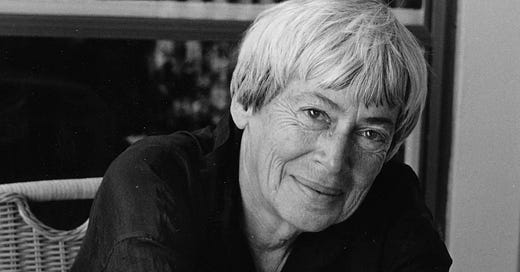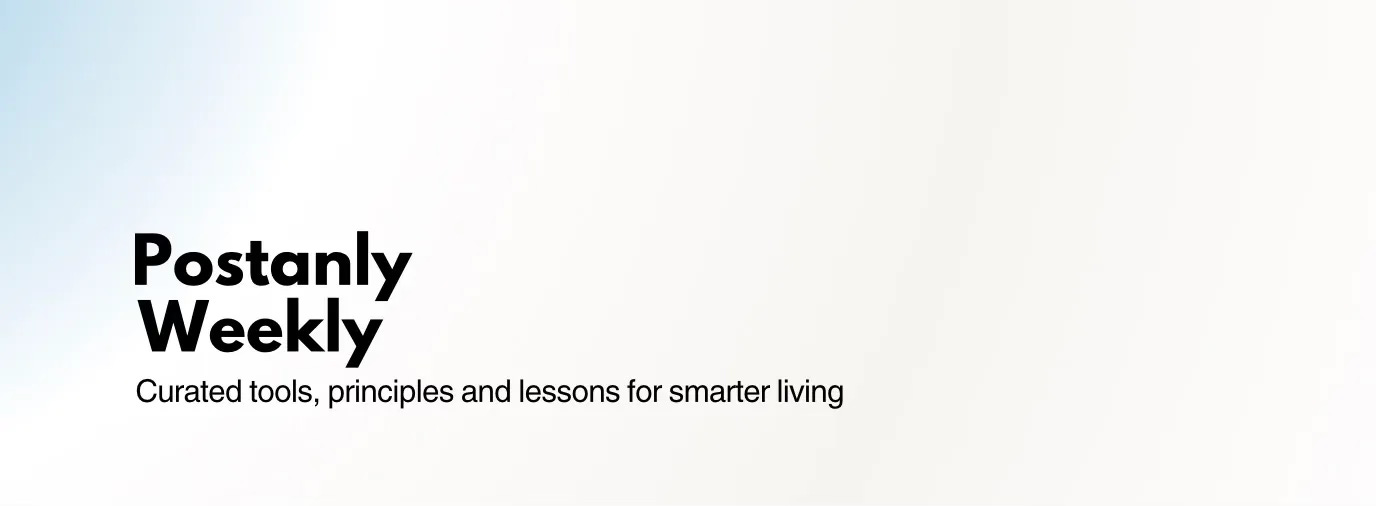Life is a question, you are the answer: Ursula K. Le Guin on time, life and meaning
The mind that watches itself transforms
Hello everyone,
Postanly Weekly is a reader-supported smarter living newsletter. To support my work, you can upgrade to a paid subscription for $7 per month or $40 for an entire year. With a modest yearly contribution you’re not only helping keep Postanly Weekly going, you also get free access to Thinking Toolbox (mental models for life) and Mental Wealth Toolbox (practical concepts for smarter decisions).
Ursula K. Le Guin’s reflections on life, time and meaning
Ursula K. Le Guin was one of the twentieth century’s most celebrated fantasy and science fiction authors. She won many awards, including a National Book Award and a Pulitzer Prize.
Her body of work (dozens of novels, short stories, essays, poetry, and plays) explore the themes of time, life and meaning with an acute sensitivity and verbal brilliance that reveal a deep understanding of human nature.
She was prolific. Guin wrote 23 novels, 12 volumes of short stories, 11 volumes of poetry, 13 children’s books, five essay collections, and four works of translation.
Le Guin’s ability to build fully realized worlds is one key to her success as a writer. These worlds are so fully realized that readers are easily transported there due to their compelling nature.
Another important factor is Le Guin’s willingness to experiment. She never stuck with any one genre for too long, instead constantly exploring new territory and building on previous successes.
She was also one of the first writers to explore themes of gender and feminism in science fiction. In her work, she often used her childhood experiences to explore human nature and the roles we play as humans.
Ursula K. Le Guin is best known for her sci-fi book, “The Hainish Cycle”, which is considered one of the most important works of science fiction literature.
“It is good to have an end to journey toward; but it is the journey that matters, in the end,” she once said. Le Guin’s work is profoundly scientific and philosophical at the same time and often deals with big questions about meaning and life.
Few writers have captured the human experience more than Ursula K. Le Guin. In her writing, you can find her reflecting on themes such as time, life and meaning in a way few other authors manage.
She explains through her brilliant writing that you can transform your life from one full of busyness and obligation into one centred on fulfilling your purpose and leveraging every minute of your existence.
Time is a crucial part of the human experience. It is the key to understanding our world, our history, and ourselves. Time is what separates one moment from another; it is what connects them; it is what happens now; it is what will happen later; it is the sum total of history and what is yet to happen.
“The thing about working with time, instead of against it, …is that it is not wasted. Even pain counts,” Ursula K. Le Guin said.
We’ve become so accustomed to rushing through life that even a passing thought can feel like we’re being left behind. As a result, we’ve come to expect things to happen immediately and resent any delays that might cause us frustration or boredom. A life spent rushing through time can leave us feeling directionless and lost, seeking answers where there may be none.
Life is a question; you are the answer
“We decided that it was no good asking what is the meaning of life, because life isn’t an answer, life is the question, and you, yourself, are the answer.” — Ursula K. Le Guin
“The only questions that really matter are the ones you ask yourself,” she observed. Le Guin’s works explore the conditions necessary for people to flourish, the costs of keeping such conditions constant, and what it means to be fully alive.
Anytime you find yourself facing a challenge or a choice, it is important to ask yourself some key questions: What do I want? What’s my goal? What do I value? How do I make the most my finite time? Why am I doing this in the first place? How do my present experiences help me explore myself?
These questions aren’t just tackled in her fiction; Le Guin was also interested in how we experience time and how this experience affects our sense of self, relationships with others, and ideas about purpose and meaning.
She is one of the most influential authors in science fiction history because she can illuminate universal truths by exploring specific circumstances or events within broader narratives.
In other words, she makes readers aware that these universal questions exist by exploring their implications with empathy and precision.
As we change and grow, so should our lives and the meaning we find in them. To thrive, we need to accept that everything changes over time and not get too attached to the idea of a permanent self or single life path. “The only thing that makes life possible is permanent, intolerable uncertainty: not knowing what comes next,” Ursula K. Le Guin observed.
Meaning can be found in the present moment as much as in anticipating a future full of promise and in recognising death’s finality. Enjoy the present and the suffering that comes with it. “The end justifies the means. But what if there never is an end? All we have is means,” she asks.
“If you evade suffering you also evade the chance of joy. Pleasure you may get, or pleasures, but you will not be fulfilled. You will not know what it is to come home,” Le Guin wrote in The Dispossessed.
Whether through art and literature or personal experience, Le Guin reminds us that no matter how strange or hard times may seem — the potential for something better lies within us all.
The freedom to explore who you truly are is deeply liberating. There’s more to your life than you can ever imagine. “All of us have to learn how to invent our lives, make them up, imagine them. We need to be taught these skills; we need guides to show us how. If we don’t, our lives get made up for us by other people,” she writes.
It’s your duty to explore your existence as deeply as possible without fear or restrictions. Don’t build walls — pursue your true north to find meaning.
Ursula K. Le Guin writes, “The duty of the individual is to accept no rule, to be the initiator of his own acts, to be responsible. Only if he does so will the society live, and change, and adapt, and survive.
Food for thought
The Mind That Watches Itself Transforms [Free read on Medium]
“I watch my unconscious mind self-correct before any thought or emotion becomes conscious action. I use it to identify a rising wave of anxiety and choose a calming way to deal with it before it escalate and cloud my judgment.
I watch my unconscious mind to acknowledge negative thoughts and emotions without judgment and choose a healthy response. Sometimes, I reframe specific thoughts before they set in motion a negative pattern. I think about my thinking or ponder my emotions before I act on them.
It’s a personal “thought” filtration process I use to respond to life’s many challenges. It’s not just about control; it’s also about self-knowledge. Understanding the “why” behind my thoughts and emotions helps me better understand my unconscious self.”
The Allergy to Uncertainty [More to That]
“Certainty is rewarded because it maximizes your ability to create value, but the tradeoff is that you stop paying attention to the things that don’t obviously contribute said value. For example, this is why some ambitious parents will answer work emails over the dinner table instead of asking their kids how their days were. Answering their boss’ email is a direct way of being valuable because that’s how they earn their salary, whereas being curious about their children has no monetary value associated with it. To a parent that values certainty above all else, it makes sense to answer that email instead of wondering how their kids’ days went.”
Joshua Foer on changing psychological time:
“Monotony collapses time; novelty unfolds it. You can exercise daily and eat healthily and live a long life, while experiencing a short one. If you spend your life sitting in a cubicle and passing papers, one day is bound to blend unmemorably into the next - and disappear. That's why it's so important to change routines regularly, and take vacations to exotic locales, and have as many new experiences as possible that can serve to anchor our memories. Creating new memories stretches out psychological time, and lengthens our perception of our lives.”
Source— Moonwalking with Einstein: The Art and Science of Remembering Everything
Atul Gawande on being human
“In the end, people don't view their life as merely the average of all its moments—which, after all, is mostly nothing much plus some sleep. For human beings, life is meaningful because it is a story. A story has a sense of a whole, and its arc is determined by the significant moments, the ones where something happens. Measurements of people's minute-by-minute levels of pleasure and pain miss this fundamental aspect of human existence. A seemingly happy life maybe empty. A seemingly difficult life may be devoted to a great cause. We have purposes larger than ourselves.”
Source— Being Mortal: Medicine and What Matters in the End
My favourite newsletters
Want to discover your next favourite newsletter? We've got you covered! Expand your newsletter list with these curated options for Postantly readers. Feed your curiosity. Supercharge your reading list with these free newsletter picks.
Explore the list of newsletters
An investment platform I recommended
Masterworks — The first AI-powered startup unlocking the “billionaire economy” for your benefit. Masterworks’ unique investment platform enables savvy investors to invest in blue-chip art for a fraction of the cost. The best part? Everyday people are already benefiting. So far, it's been right on the money. Every one of their 16 exits has been profitable, with recent exits delivering +17.8%, +21.5%, and +35.0% net annualized returns. Intrigued? Postanly readers can skip the waitlist with this exclusive referral link. Skip the waitlist
Work with Postanly. Partner with us here.
Thanks for reading!
Until next week,
Thomas
Medium | All Courses | The Write Life | Philosophy For Modern Life
Postanly Weekly is now a reader-supported publication. To support my work, you can upgrade to a paid subscription for $7 per month or $40 for an entire year. With a modest yearly contribution you’re not only helping keep Postanly Weekly going, you also get free access to Thinking Toolbox (mental models for life) and Mental Wealth Toolbox (practical concepts for smarter decisions).




